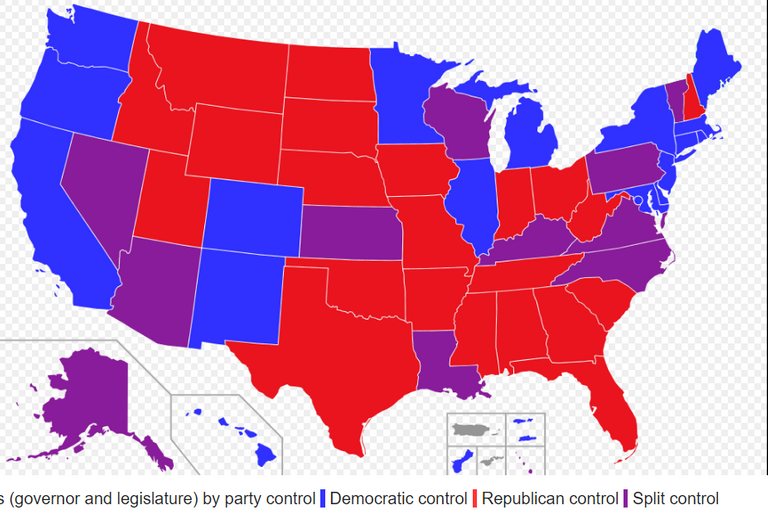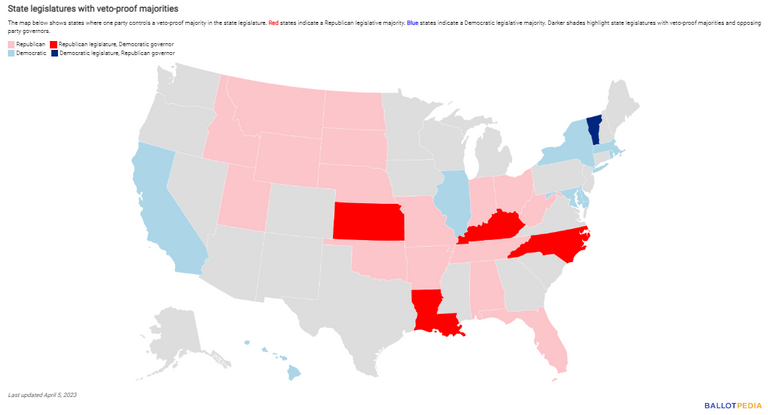9 of the 10 States Suing Coinbase Have No Political Gridlock
Gridlock matters and it is good for cryptocurrency owners.
10 states sued Coinbase two days ago for violating securities laws in their respective states. It's an opportunistic time to pounce on cryptocurrency firms as the voter base trends considerably older than the median age of the residents who live in their respective states. There is a bit of a commonality between almost all of these states suing Coinbase and taking their first offensive against cryptocurrencies, the belief that they have a mandate to do so from their residents. These states formed a multi-state task force and are acting to stop the "selling of unregistered securities." Crypto owners may read the language in the suit against Coinbase and brush it off as no big deal, but this should be a warning to those who hold crypto as this could be just the beginning.
Where the Concept of Mandates on the State Level are Derived
The idea that a state government in the form of the executive and legislative branches may have a mandate comes in generally two forms.
1. Executive and Legislative Majority Under One Party Control
This is pretty obvious, but there's a small caveat that provides an exception and creates a different sort of an idea of a mandate. The Governor and the State Legislature, whether it is a unicameral or bicameral, fall under the same party. This makes it rather easy to pass laws without much delay.
The exception falls when an Executive Branch officeholder is not the Governor as in many states Attorneys General are voted into office and the people of the particular may choose an Attorney General from a different party than the Governor. It may be the case that an Attorney General and the State Legislature are on the same side, which may create a perceived mandate on more specified matters.
2. Veto-Proof Majorities in State Legislatures
A veto-proof majority in a state legislature has the power to render a Governor rather weak from a policy-making perspective. The state legislature can act as a representative oligarchy of sorts and the power on this institution is unchecked until the next election. It is seen as a mandate by those with the political capital in the state capitols.
The State of Power Balances on the State Level
Political Control by State

State Legislatures with Veto-Proof Majorities

Source of Veto-Proof Majority Map
It is important to keep these maps in mind when examining the individual states that have chosen to sue Coinbase and take a hostile stance toward cryptocurrencies.
Reviewing the Plaintiff States
Alabama
The Republican Party has complete control of policy and enforcement of laws in the State of Alabama. If Governor Kay Ivey disagreed with the State Legislature, she could be easily overridden on any veto attempt. She could also literally dictate whatever policy she wants to put in place and the State Legislature could opt to fall in line.
Steve Marshall (R-AL) is the Attorney General of Alabama. There's no conflict here and the State Government of Alabama is on the attack against Coinbase and possibly crypto as a whole with a voter mandate.
California

The Democratic Party has complete control of policy and enforcement of laws in the State of California. Governor Gavin Newsom has the same situation as Kay Ivey of Alabama.
Rob Bonta (D-CA) is the Attorney General of California.
Illinois

The Democratic Party has complete control of policy and enforcement of laws in the State of Illinois. Governor J.B. Pritzker has the same situation as Kay Ivey of Alabama and Gavin Newsom of California.
Kwame Raoul (D-IL) is the Attorney General of Illinois.
Kentucky

Governor Andy Beshear (D-KY) faces a veto-proof majority in the State Legislature held by Republicans. The State Legislature of Kentucky can easily steamroll past any veto attempt and thus have the policy making control in the Commonwealth of Kentucky.
Kentucky's Attorney General, Daniel Cameron, is a Republican and he happens to be Beshear's opponent in the 2023 Gubernatorial Election this November.
Maryland

The Democratic Party has complete control of policy and enforcement of laws in the State of Maryland. Governor Wes Moore has the same situation as Kay Ivey of Alabama, J.B. Pritzker of Illinois, and Gavin Newsom of California.
Anthony Brown (D-MD) is the Attorney General of Maryland.
New Jersey

Governor Phil Murphy (D-NJ) neither enjoys a veto-proof majority nor is rendered powerless by one from the Republican Party. However, the Democratic Party does enjoy control of both the State Legislature and Executive Branch in Trenton. This makes it much easier for Murphy and the Democratic Party to pass legislation they desire.
Matt Platkin (D-NJ) is the Attorney General of New Jersey.
South Carolina

South Carolina has a temporary veto-proof majority in the legislature as there is a seat vacant in the South Carolina State Senate. It should not be much of an issue for Governor Henry McMaster, as he is a Republican and would enjoy the same situation as Governor Kay Ivey of Alabama, but on a temporary basis.
Alan Wilson (R-SC) is the Attorney General of South Carolina.
Vermont

Vermont is the complete opposite situation as Kentucky. Governor Phil Scott (R-VT) is also not a typical Republican as he is a far more moderate Republican. Furthermore, Vermont's Governor is elected every two years and a Governor can serve theoretically an unlimited number of consecutive terms. Democrats in the Vermont State Legislature hold a veto-proof majority.
The Attorney General of Vermont is a Democrat as well, Charity Clark.
Washington

Governor Jay Inslee (D-WA) neither enjoys a veto-proof majority nor is rendered powerless by one from the Republican Party. However, the Democratic Party does enjoy control of both the State Legislature and Executive Branch in Olympia. This makes it much easier for Inslee and the Democratic Party to pass legislation and govern as they desire.
Bob Ferguson (D-WA) is the Attorney General of Washington State.
Wisconsin

Wisconsin Republicans have a near veto-proof majority in both the House and Senate, but they are not there yet. Wisconsin still has a little bit of gridlock. Governor Tony Evers (D-WI) has to walk a fine line in Madison. The State Senate has a supermajority, but the State Assembly does not.
Josh Kaul (D-WI) is the Attorney General of Wisconsin.
General Rule of Thumb: Gridlock is Good for Crypto
Without supermajorities in legislative bodies, veto-proof legislatures, and/or one party majority control in a state, it is less likely that any sort of offensive toward crypto is made. There is no mandate and not much can get done. Gridlock and division is good, which is why the development out of North Carolina where Rep. Tricia Cotham switched her party affiliation from the Democratic Party to the Republican Party should be seen as a warning sign for crypto holders in the Tar Heel State.
It is important to be vigilant and understand the dynamics that happen in state politics and also the sentiments/demographics of the populace. Remember, older people comprise most of the voter base and they are generally anti-crypto.
Here are a few states that are less likely to come after crypto holders and firms.
- Virginia
- Nevada
- Arizona
- Pennsylvania
Gridlock and the lack of mandate make it tougher for these four states to behave like those 10 listed above and the State of New York, which is the most anti-crypto state in the Union. It's possible that in 2025, North Carolina could become the fifth state on this list.
